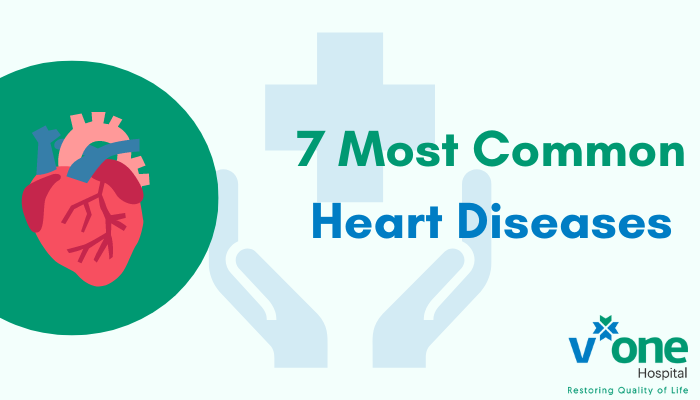7 Most Common Heart Diseases – Symptoms & Treatment
A study in Lancet discovered that heart disease killed more than 2.1 million people in 2015 alone. This is more than 25% of all deaths that happened that year. In fact, every 33 seconds, one person dies from a heart attack in India.
7 Most Common Heart Diseases in India
Here are the most common heart diseases that people suffer in India:
1. Rheumatic Heart Disease
This chronic heart condition caused by rheumatic fever is very common in children. When rheumatic fever affects joints, the heart, and the central nervous system, it damages the heart’s valves.
Symptoms of rheumatic heart disease:
- Chest pain
- Fatigue
- Skipping a heartbeat
- Fainting
- Swollen ankles
- A thumping feeling in the chest
Depending on how severe it is, rheumatic heart disease can be treated with:
- Antibiotics for strep throat
- Medicines for blood thinning
- Surgery that repairs valves of the heart
2. Ischemic Heart Disease
Also called coronary artery disease, this encompasses all those diseases of the heart that reduce oxygen supply to the myocardium (muscle of the heart).
Since blood carries oxygen throughout the body, when the heart receives a reduced blood supply, it will not receive enough oxygen. This causes angina. First, your chest starts hurting, and then, it spreads to the left arm, shoulder, and jaw, also causing you to sweat and feel out of breath.
Causes:
- Smoking
- High cholesterol
- Hypertension
- Diabetes Mellitus
- Genetic & hereditary factors
- Stress
Symptoms:
- Neck/jaw pain
- Shoulder/arm pain
- Fast heartbeat
- Shortness of breath
- Nausea, vomiting
- Sweating
- Fatigue
Ischemic heart disease can be treated with:
- Organic nitrates
- Beta-blockers
- Aspirin
- Calcium channel blockers
3. Valvular Heart Disease
The heart has different types of valves that control the speed and direction of the blood flow. With age, the various valves of the heart can get damaged. When they become thin and hard, (or even close up), it changes the blood flow speed.
While it progresses slowly, the symptoms appear suddenly:
- Palpitations
- Chest pain
- Fatigue
- Giddiness
This can be treated with:
- Long-term antibiotic therapy
- Clotting-prevention medication
- Balloon dilatation
4. Inflammatory Heart Disease
In this, the pericardium gets inflamed.
Causes:
- Bacterial/fungal infection
- Heart attack, myocarditis
- Radiation therapy for the chest
- Medicines that suppress the immune system
- Cancer, leukemia, tuberculosis, kidney failure
Symptoms:
- Fatigue
- Severe chest pain
- Anxiety
- Dry cough
- Difficulty breathing when lying down
This can be treated with:
- Antibiotics
- Heart medication
- Corticosteroids
- Inflammation-reducing drugs
- Heart rhythm devices
5. Cerebrovascular Disease
This disease affects blood circulation to the brain. This is mainly caused by atherosclerosis, a condition where the continual accumulation of fat deposits causes the artery walls to become thick and stiff.
Causes:
- Atherosclerosis
- Embolism
- Low-fat states
- Aneurysms
Hypertension, smoking, diabetes, and obesity can increase the risk of cerebrovascular heart disease.
Symptoms:
- Dizziness, nausea, vomiting
- Severe headache
- Slurred speech
- Confusion, disorientation, memory loss
- Numbness/weakness in an arm or leg
- Loss of vision
- Facial weakness or droop
This can be treated with:
- Surgery
- Antiplatelet medication
- Blood thinning medication
- Anti-diabetic medication
- Lifestyle changes
6. Hypertensive Heart Disease
This disease is caused by high blood pressure, and it damages the heart and the blood vessels by overburdening them.
One such heart disease is an aneurysm, which causes an artery to swell/bulge in any part of the body. An aneurysm can be silent, but it can also be fatal. Another one is atherosclerosis. We read about this in the previous point- atherosclerosis is when plaque (fat deposits) accumulate on the artery walls and make them thick and stiff, restricting blood flow. Although this can happen in any part of the body, when it happens in the heart, it’s called coronary artery disease. And when the flow of blood in blood vessels increases, it gives birth to cardiovascular diseases like heart failure and renal failure.
7. Stroke
When the blood supply to the brain is interrupted, that is a stroke. When this happens, you can have trouble walking, speaking, and comprehending. You can also experience paralysis or numbness in the face, arm, or leg. In fact, a stroke is a medical emergency. When you have a stroke, you need immediate care. Yet, more than 1,000,000 people suffer from a stroke every year in India.
There are three main types of stroke:
- Transient Ischemic Attack (TIA)
- Ischemic Stroke
- Hemorrhagic Stroke
Things that increase your risk for a stroke:
- A diet high in salt, saturated and trans fats, and cholesterol
- Inactivity
- Heavy alcohol use
- Tobacco use
- Family history
- Gender, age, and race
Symptoms of a stroke:
- Paralysis
- Numbness/weakness in arm, face, and leg
- Slurred speech
- Trouble walking, speaking, and understanding others
- Confusion, disorientation
- Sudden behavioral changes
- Blurred vision, double vision, or loss of vision
- Loss of balance
- Dizziness
- Seizures
- Nausea, vomiting
- Severe headache
And a stroke can be treated with:
- Clot-breaking medication
- Surgery
- Stents
- Mechanical thrombectomy
- Coiling
- Clamping
- Anticoagulants
- Antiplatelet medication
These were the seven most common heart diseases along with their symptoms, causes, and treatment options.

